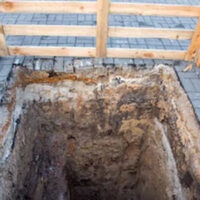The Constitutional Challenge to a Sinkhole Claim Law

In the world of homeowner’s insurance, it is rare that constitutional questions come into play. But sometimes they do. One example where this happened was in 2012, when the Florida Appellate Courts determined what the Florida legislature could do in homeowner’s insurance cases.
Law is Challenged as Unconstitutional
The case involved a challenge to a law passed by the Florida Legislature which required a neutral evaluation of sinkhole damage claims. The law said that the individual doing the evaluation had to have certain qualifications, and required that the parties submit their sinkhole claims to the neutral evaluator before they could actually file a lawsuit.
The law was challenged on the basis of separation of powers. According to the homeowner, congressional bodies like the Florida Legislature cannot write laws that infringe on the Court’s ability to do its business. When the legislature tells courts that the court has to consider the opinion of anybody, it potentially infringes on the Court’s ability to do its job.
Court Finds the Law Constitutional
However, the Florida appellate courts disagreed. The court pointed out that the statute was not requiring that anybody’s testimony be admissible in court. Rather, the statute just required that the parties engage in a pre-suit process to try to resolve the case before going to court.
Pre-suit alternative dispute resolution is common in many kinds of cases, and requiring that parties submit to an arbitrator, mediator or in this case, a pre-suit neutral evaluator, did not infringe on the Court’s power at all.
Admissibility of Evidence Challenged
The challenged law also said that the report of the neutral evaluator had to be admissible in trial. Once again, the decision as to what is and is not admissible, is something that courts decide. There is a written evidence code, with laws passed by the legislature.
However, when a law specifically says that a given report, no matter what, has to be admissible in every single case, the legislature is in effect telling a judge what he or she must do in the course of a trial. That violates separation of powers, according to the homeowner challenging the law.
But ultimately, the Florida Supreme Court disagreed, saying that the law was constitutional. The Court said that although the law required the neutral evaluator’s report must be admitted as evidence, it didn’t say the court had to listen to the evidence, or give the evidence any degree of importance or weight.
In fact, the Court even said—in a somewhat confusing manner—that Courts could still rule the report inadmissible on other grounds in the Florida evidence code. For example, even though the report was admissible under the statute, the Court could still find it inadmissible for being, for example, too highly prejudicial.
Questions about whether damage to your home or to your property should be covered by your insurance policy? Contact the Miami property damage insurance attorneys at Velasquez & Associates P.A. today for help.
Resources:
leg.state.fl.us/statutes/index.cfm?App_mode=Display_Statute&URL=0000-0099/0090/Sections/0090.403.html
scholar.google.com/scholar_case?case=13986608408215012605&hl=en&as_sdt=6&as_vis=1&oi=scholarr
https://www.jvelasquezlaw.com/exploding-bodies-and-named-peril-insurance-policies/
